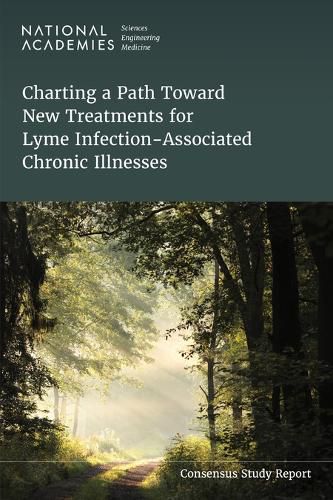Readings Newsletter
Become a Readings Member to make your shopping experience even easier.
Sign in or sign up for free!
You’re not far away from qualifying for FREE standard shipping within Australia
You’ve qualified for FREE standard shipping within Australia
The cart is loading…






Around 10-20% of people who contract Lyme disease, the most common tickborne disease in the U.S., develop persistent, often debilitating symptoms such as chronic pain, fatigue, and cognitive dysfunction. Lyme infection-associated chronic illnesses (IACI) share symptoms common to other IACI such as Long COVID and myalgic encephalomyelitis/chronic fatigue syndrome. Despite the chronic impact on the quality of life for many people, there are currently no validated interventions to treat Lyme IACI.
In response to this unmet need, the Steven & Alexandra Cohen Foundation asked the National Academies to convene a committee of experts to assess the evidence for disease mechanisms, diagnoses, and treatments of Lyme IACI and illuminate a pathway for the development of new treatments. The resulting report, Charting a Path Toward New Treatments for Lyme Infection-Associated Chronic Illnesses, makes recommendations around developing treatments that improve function and quality of life based on currently available evidence, while continuing research to identify root causes and mechanisms of the disease.
Table of Contents
Front Matter Summary 1 Introduction 2 State of the Evidence 3 Building on Research from Other Infection-Associated Chronic Illnesses 4 Innovative Approaches to Accelerating Lyme IACI Research 5 Recommendations Appendix A: Committee Meeting Agendas Appendix B: Committee Member and Staff Biographies Appendix C: Methodology of Literature Review
$9.00 standard shipping within Australia
FREE standard shipping within Australia for orders over $100.00
Express & International shipping calculated at checkout
Around 10-20% of people who contract Lyme disease, the most common tickborne disease in the U.S., develop persistent, often debilitating symptoms such as chronic pain, fatigue, and cognitive dysfunction. Lyme infection-associated chronic illnesses (IACI) share symptoms common to other IACI such as Long COVID and myalgic encephalomyelitis/chronic fatigue syndrome. Despite the chronic impact on the quality of life for many people, there are currently no validated interventions to treat Lyme IACI.
In response to this unmet need, the Steven & Alexandra Cohen Foundation asked the National Academies to convene a committee of experts to assess the evidence for disease mechanisms, diagnoses, and treatments of Lyme IACI and illuminate a pathway for the development of new treatments. The resulting report, Charting a Path Toward New Treatments for Lyme Infection-Associated Chronic Illnesses, makes recommendations around developing treatments that improve function and quality of life based on currently available evidence, while continuing research to identify root causes and mechanisms of the disease.
Table of Contents
Front Matter Summary 1 Introduction 2 State of the Evidence 3 Building on Research from Other Infection-Associated Chronic Illnesses 4 Innovative Approaches to Accelerating Lyme IACI Research 5 Recommendations Appendix A: Committee Meeting Agendas Appendix B: Committee Member and Staff Biographies Appendix C: Methodology of Literature Review